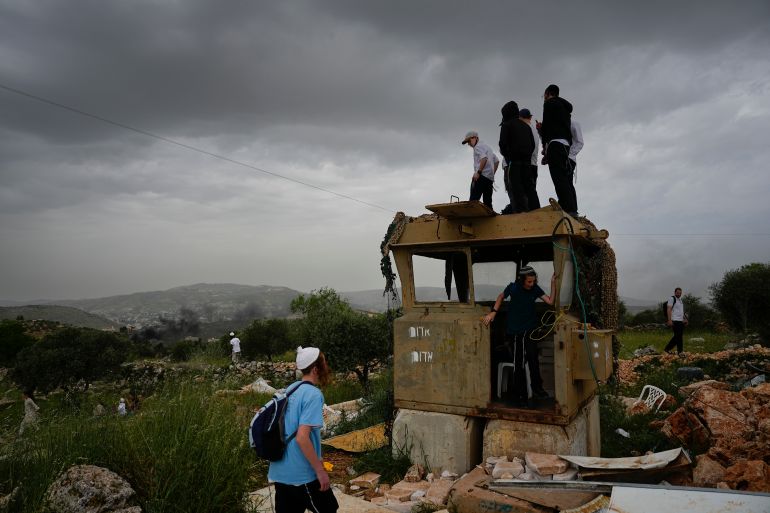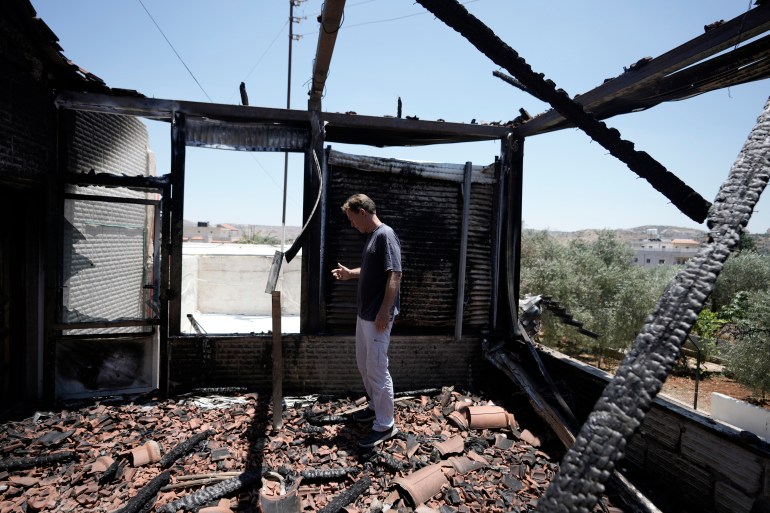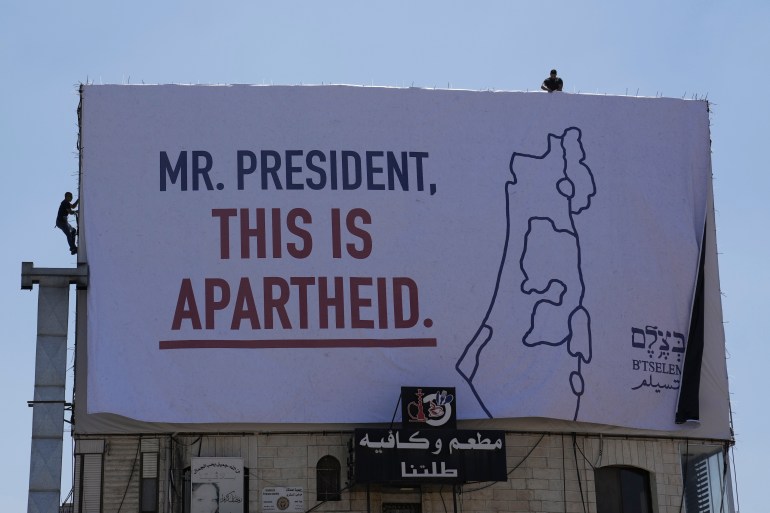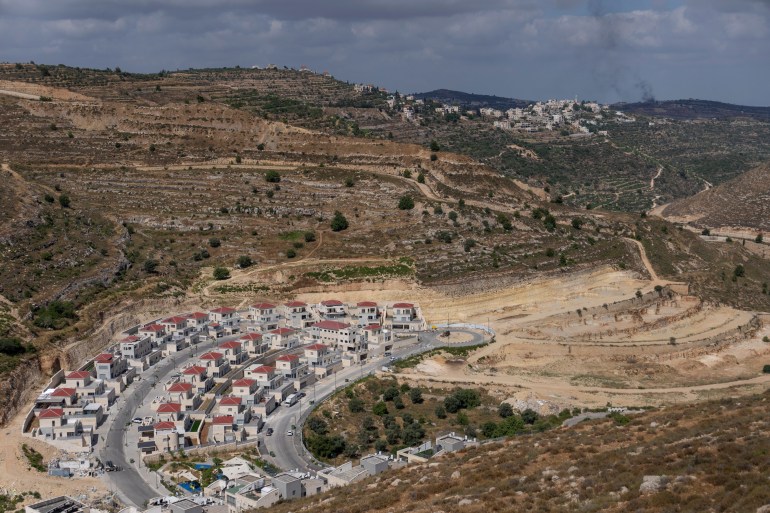Can the Palestinian Authority protect Palestinians from settlers?
Calls grow for the Palestinian Authority to protect Palestinians against increasing violent settler attacks.

Ramallah, occupied West Bank – “Either arm us or protect us,” an elderly man fervently told Palestinian Prime Minister Mohammad Shtayyeh in the village of Turmus Aya in the occupied West Bank hours after hundreds of Israeli settlers carried out a vicious attack there last week.
In a video that went viral, the man, whose home was among 30 houses and 60 cars torched in the attack on June 21, held the Palestinian Authority (PA) responsible for failing to protect Palestinians.
Keep reading
list of 4 itemsWhy does Israel keep raiding the Jenin refugee camp?
Palestinian Authority arrest campaign ‘one of the worst in years’
Palestinian Authority officer killed by Israeli forces in Jenin
“You have 70,000 armed men. Distribute them across our villages,” he roared.
Another Palestinian, Omar Qattin, a 27-year-old father of two, was killed and dozens of others injured. It is not clear whether Qattin was killed by a settler or an Israeli soldier.
The same day, another resident of Turmus Aya interrupted an Al Jazeera Arabic live broadcast from the village to make one comment: “I have a message for [PA President] Mahmoud Abbas: If you are not up to the task of protecting your people, step down.”
The remarks by the two men are reflective of growing anger on the Palestinian streets against the PA for failing to protect people as settler attacks continue and become increasingly violent.
Residents and analysts in the West Bank say while they do not believe the PA has the military capabilities – nor the political will – to confront the Israeli army, the least they could do is create mechanisms to protect the residents against further attacks.
“Protecting the people should be at the top of the priorities of the PA. They should not be leaving people to face the settlers on their own, with their bare bodies,” Ameed Desouki, a member of the local council of Burqa village in Nablus which recently was the target of large-scale settler attacks, told Al Jazeera.
“People are sitting there waiting to be slaughtered like sheep during Eid al-Adha,” he added, referring to the Muslim festival this week.
‘Protection committees’
The attack on Turmus Aya came as part of a sharp increase in coordinated and armed settler attacks since October, carried out under Israeli army protection across the West Bank. They have included shootings, arson attacks, rock-throwing, and physical assault with pipes and other objects.
Settler attacks spiked in the backdrop of a re-emerging Palestinian armed resistance to decades-long Israeli military occupation which consequently triggered deadly Israeli army raids on Palestinian towns and villages.
Between 600,000 and 750,000 Israeli settlers live in at least 250 illegal settlements and outposts built by the Israeli government and settlers across the West Bank and occupied East Jerusalem. The vast majority of Israeli settlements were built either partially or entirely on private Palestinian land.
In February, hundreds of Israeli settlers carried out what was described as a “pogrom” across a number of Palestinian villages in the Nablus area, during which one Palestinian man was killed by the settlers and dozens of homes and cars set ablaze. At least 390 Palestinians were injured in the attack.
In May, an entire Palestinian community in Ramallah was forcibly displaced due to settler attacks and Israeli army restrictions, which rights groups call a “war crime”.
The relentless attacks have led to a recurring debate over the PA’s ability and willingness to protect the three million Palestinians it exercises limited rule over in the West Bank.
“I believe the PA must have a role in forming protection committees,” said Desouki.

“In every area in Burqa, there are young men from the security services. The PA must make these people available. We are not asking them to engage in armed confrontation but at least to be present in the areas where there is friction with the settlers.
“In addition to the security forces, we want ambulances and civil defence teams to be on call as part of these committees so that if any attack happens, there could at least be attempts to block the settlers and teams ready to save people,” he said.
Occupied West Bank-based analyst Ismat Mansour said while the PA has limited capabilities, it does have the means to protect people.
“The 70,000 officers and the light weapons they have are not enough to confront the occupation. These are all defensive weapons, all of which are subject to monitoring and approval by the Israeli occupation and the Americans,” Mansour told Al Jazeera.
“While this weaponry is not suited for confrontation, it is suited for protecting our people in such situations,” he said, adding that settler attacks “can be confronted through a national resistance programme on the ground which people can form even with simple means and tools”.
“It would be protected on a popular level by the people and would gain support, and it may at that point gain interest of the world and warrant some kind of international intervention,” he said.
Such a decision, said Mansour, would require the PA to make serious changes to its role in the West Bank, which he explained would come at a cost to the top PA officials and their interests.
“The PA suffers from impotence as a result of its structure and composition – not merely because of the restrictions imposed on it by Israel. It is because of the intertwining of the personal benefits and interests that the PA leaders enjoy, and the role they are carrying out, which is dependent on the occupation’s approval and satisfaction, and US support,” he said.
Al Jazeera reached out to the PA for their comments but did not hear from any official.

Structural problem
The PA was created under the 1993 Oslo Accords between the Palestine Liberation Organisation (PLO) and Israel. It was formed as an interim, five-year governing body meant to lead to an independent Palestinian state with the occupied territories of East Jerusalem, the West Bank and the Gaza Strip.
However, the Israeli occupation and restrictions, illegal land grabs and settlements among other factors prevented the formation of a Palestinian state.
Today, the PA retains largely administrative control over about only 18 percent of the occupied West Bank, comprising the city centres.
The Oslo Accords stipulated the number of officers the PA was allowed to have, their areas of operation as well as the number and type of weapons they were allowed to carry – all reviewed and subject to approval by Israel. The approved weapons included automatic rifles, small pistols and limited ammunition.
Under the agreement, the PA was also required to share intelligence with Israel as part of its highly criticised policy of “security coordination” and to aid in thwarting armed resistance by Palestinians, including by helping with arrests.

During the second Intifada, the mass Palestinian uprising between 2000 and 2005, Israel destroyed the PA’s security establishment after many Palestinian security officers participated in the resistance.
In 2005, the United States, the European Union and Israel intervened to enforce a restructuring of the PA security apparatus. The EU’s Coordinating Office for Palestinian Police Support (EUPOL COPPS) and the US Security Coordinator (USSC) office were created to train its officers and procure weapons for it.
As a result, the PA security forces came to be known as Dayton’s forces, a reference to Keith Dayton, the US lieutenant general who led the “reinvention” of the PA security apparatus.
Today, the occupied Palestinian territory has one of the highest ratios of security personnel to civilians in the world.
The analysts, on the other hand, say the post-Intifada era saw the creation of a “new type” of Palestinian security establishment, one that is favourable to Israel and the international community.
“The revolutionary elements inside the PA forces were taken out in favour of the ‘new Palestinian’, the new Palestinian security officer that was developed by Dayton and that apparatus,” Saleh Abd al-Jawad, a professor of politics at Birzeit University, told Al Jazeera.
“Today, there is a structural problem in the PA. It is absent on the ground. They only condemn and criticise but other policies must be introduced. There are pockets of West Bank that the PA cannot enter any more, including Balata refugee camp in Nablus, Jenin refugee camp and other areas,” he said.
‘Situation may backfire against PA’
With the re-emergence of Palestinian armed resistance, particularly in Nablus and Jenin, Israel has been pressuring the PA to clamp down on fighters and help thwart another uprising. This, experts say, includes a quiet process of the PA bribing fighters, particularly in Nablus, to hand themselves and their weapons over in exchange for amnesty from Israel if they serve time in PA prisons.
“The occupation is pressuring the PA to crack down on any resistance, it is even pushing the PA into a place of confrontation with armed resistance fighters as opposed to protecting them,” said Mansour, the analyst.
In September last year, Palestinian fighters in Nablus clashed with PA security forces after the latter arrested two leaders in the Lions’ Den armed resistance group who were on Israel’s wanted list. A 53-year-old Palestinian man was killed in the clashes.
According to Mansour, the PA may be forced into a confrontation with the Palestinian people if it does not take immediate steps to change its role and image.
“If the PA does not improve its administration of the crisis on the ground and does not take immediate steps to improve its image and to become closer to the people, then I think the situation may backfire against it,” said Mansour.
“If the leaders of the PA let go of their personal interests and engage in an operation on the ground that all the people and the political parties can get behind, then the PA’s role may change.
“I think that as soon as the PA shows readiness and takes steps to change its current policies, that enough will cause the world to mobilise to pressure Israel and the settlers, and will increase interest in the Palestinian cause,” he said.
“When the Americans and the Israelis feel – especially the security establishment – that the PA is beginning to move towards taking a different role, and that there might be an escalation that all Palestinians will take part in, I believe there will be an immediate mobilisation and change in the political process. And the Americans will intervene.”